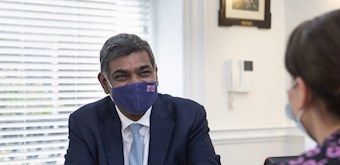Bradycardia
An abnormally slow heart rate
Bradycardia is diagnosed when a heart rate of less than 60 beats per minute is recorded
What is Bradycardia?
Bradycardia is the medical term used to describe a heart rate which is lower than normal.
Some people - for example athletes who are very fit - have a naturally low heart rate but do not experience any symptoms.
However, sometimes bradycardia is the result of a problem with the electrical impulses in the heart, which prevents it from pumping enough blood around the body. This can lead to symptoms including tiredness, dizziness, shortness of breath or palpitations.
Bradycardia can be caused by many factors, including a congenital heart defect (a heart problem which has been present since birth), damage to the heart muscle from a heart attack, or inflammation of the heart tissue (myocarditis).
It can also be caused by certain medications (including beta blockers), or medical conditions such as an underactive thyroid or Lyme disease.
Types of bradycardia (bradyarrhythmias)
There are several different types of bradycardia, and not all types are dangerous. Although your doctor may diagnose bradycardia if you have a resting heart rate below 60 beats per minute, this does not necessarily mean you need treatment.
Some people have a naturally low heart rate (such as athletes). For most of people, there are times when your heart beats more slowly without any cause for concern (for example when you are relaxed, or asleep). However, sometimes bradycardia has an underling cause which requires treatment. Your cardiologist will carry out a full assessment in order to diagnose which type of bradycardia you have. The most common types of bradycardia include:
- Sinus bradycardia: this is most common in children, older adults and athletes. Some people with sinus bradycardia will not have any symptoms. It occurs when the heart’s normal pacemaker (the sinus node) does not work properly, resulting in a slow heartbeat
- Sick sinus syndrome: this is a rare type of cardiac arrhythmia in which the heart rate can alternate between very fast (tachycardia) and very slow (bradycardia)
- Heart block (also known as atrioventricular/AV block): electrical impulses through the heart are blocked, causing the heart to beat more slowly or with an irregular rhythm (arrhythmia).
Other types of bradycardia include:
- Nocturnal bradycardia: many healthy people have low heart rates whilst sleeping and in most cases, this is no cause for concern
- Junctional bradycardia: usually caused by the absence of the electrical impulse from the sinus node. As a result, the heartbeat is generated by the AV (atrioventricular) junction but is slower than normal
- Reflex bradycardia: this occurs as a response to the baroreceptor reflex, in which the body responds to an abnormal increase in blood pressure by reducing cardiac output (heart rate and volume of blood being pumped out of the heart). It is a normal function of the body, which helps to regulate blood pressure
If you are worried about your heart rhythm or think that you may have bradycardia, then you should speak to your GP as soon as possible and arrange for a referral to a cardiologist.
Bradycardia heart rate
Healthy adults usually have a heart rate between 60 and 100 beats per minute (BPM) during normal activities.
Less than 60 BPM is usually diagnosed as bradycardia.
Bradycardia symptoms
If you have bradycardia, then your heart may not be pumping efficiently. This means that your organs are not receiving enough oxygenated blood, which can lead to symptoms including:
- Slow pulse
- Heart palpitations (a thumping or fluttering feeling in your chest)
- Chest pain (the type of pain will depend on the underlying cause)
- Feeling short of breath after minimal exertion
- Fatigue (tiredness)
- Feeling low in energy
- Fainting or blackouts (syncope)
- Confusion, memory loss or difficulty concentrating
If you are experiencing these symptoms, it does not necessarily mean you have bradycardia. Several of these symptoms are also associated with other conditions such as stress, anaemia and hormonal imbalances. Contact your doctor who can arrange for diagnostic tests.
If you think your heart rate may be slow, then you can take your own pulse by placing two fingers gently on the inside of your other wrist. Once you feel your pulse, count the number of beats in 30 seconds and multiply this number by two, to calculate your beats per minute. If the number is below 60, you may have bradycardia.
If you are worried about bradycardia, or are experiencing any of the symptoms listed above, then you should contact your doctor as soon as possible or make an appointment with a cardiologist.
However, if you have chest pain which does not pass after a few minutes, or if you are having difficulty breathing, then you should call emergency services immediately.
Many healthy people live with bradycardia without experiencing any symptoms. Whether you experience symptoms - and how severe they are - will depend on the underlying cause of your bradycardia.
Causes of bradycardia
Bradycardia can be caused by:
- • Problems with the heart’s electrical system
- • Damage to the heart tissue from heart disease, a heart attack or complications from heart surgery
- • Congenital heart defects (heart problems which are present at birth)
- • Myocarditis (inflammation of the heart tissue)
- • An underactive thyroid gland (hypothyroidism)
- • A chemical imbalance in the blood
- • Sleep apnoea, a condition which causes repeated pauses in breathing during sleep
- • Other medical conditions including rheumatic fever, lupus and Lyme disease
- • Certain medications such as beta blockers, or drugs to treat other heart rhythm disorders
For some people, bradycardia is normal and poses no health risk. However, in some cases bradycardia requires treatment, particularly if you are experiencing unpleasant symptoms or if it is very severe.
-
Bradycardia and high blood pressure icon plus
Although it is rare, some people have bradycardia (low heart rate) and high blood pressure at the same time. This happens because even though your heart is beating at a lower rate than normal, there is increased pressure on your blood vessels, resulting in high blood pressure (hypertension).
In most cases this is a side effect of medications - such as beta blockers or calcium channel blockers - used to lower blood pressure. These medications work by reducing your pulse, so that the pressure on your heart is reduced.
In other cases, it can be caused by a thickening of the heart tissue (a result of chronic high blood pressure) or traumatic brain injury.
If you have high blood pressure with a low pulse rate, your cardiologist will carry out a full assessment to determine the cause.
Bradycardia risk factors
Although bradycardia is sometimes caused by a congenital heart problem, there are certain lifestyle factors which lead to an increased risk of developing the condition.
Factors which increase your risk of developing heart disease will also increase the risk of bradycardia. They include:
- Age: bradycardia is more common in people over the age of 65
- High blood pressure
- Being very overweight
- Smoking
- Drinking too much alcohol
- Taking illegal drugs
- Stress and anxiety
- Unhealthy blood cholesterol levels
- Not getting enough physical activity
- Eating a diet high in saturated fats, trans fat, sugar and cholesterol
All of these factors increase your risk of developing heart problems -including bradycardia - in the future.
Need to know
-
How is bradycardia diagnosed? icon plus
If your GP suspects you may have bradycardia, they will refer you to a cardiologist for further diagnostic tests. These tests may include:
- A physical examination: a doctor will listen to your heart, take your blood pressure and may refer you for blood tests. They will ask you about your symptoms, medical history and family history
- Electrocardiogram (also known as an ECG or EKG): a test which measures the electrical activity of your heart. An ECG can diagnose bradycardia and other types of abnormal heart rhythms. During an ECG, sensors containing electrodes are attached to your chest with sticky pads. These sensors are connected to a computer which reads the electrical activity of your heart. It is a painless procedure which usually takes around 5 minutes to complete. If your symptoms are triggered by exercise, your cardiologist may also carry out an exercise ECG, which records your heart rhythm while you are using a treadmill or exercise bike
- Echocardiogram: this is an ultrasound scan which is used to check whether your heart and valves are working properly. During the procedure (which is similar to a pregnancy ultrasound), you will be asked to lie on your back and side whilst the consultant applies a special gel to your chest and moves an ultrasound probe over the area. This type of scan uses sound waves and echoes to create a moving image of your heart. It is painless and usually takes around 20-30 minutes to complete
- Holter monitor (also known as an ambulatory electrocardiogram): this is a mobile electrocardiogram which is worn on your body for a period of time, usually between 24 hours and 7 days. It works the same way as an electrocardiogram. Electrodes are attached to your chest with sticky pads, and these are connected to a small monitor which you wear in a bag over your shoulder or around your neck. During the monitoring period, you will need to keep the Holter on at all times and avoid getting it wet (although it can be easily removed when you want to have a bath or shower). You may be asked to keep a diary of your symptoms whilst you are wearing the monitor. Holter monitors are used to evaluate heart rhythm changes which cannot easily be seen on other tests such as an ECG.
-
Potential treatment options icon plus
If you're diagnosed with bradycardia, your treatment will depend on the cause and severity of your condition. It may involve stopping or changing certain medications, or making changes to your lifestyle. If you don’t have any symptoms, or if your bradycardia is mild or infrequent, then you may not need any treatment at all.
If your bradycardia is related to an underlying condition, such as hypothyroidism (an underactive thyroid) or congenital heart disease, your treatment will usually focus on managing that condition.
In some cases, especially if the cause of your bradycardia is a problem with the heart’s electrical system, you may need to have a pacemaker fitted. A pacemaker is a small electrical device which is fitted under the skin, to monitor your heart’s rhythm and send tiny electrical impulses to restore your heart rate to normal.
Your cardiologist will work with you to determine the best treatment options.
Preventing bradycardia
In many cases, bradycardia is caused by damage to the heart tissue from cardiovascular disease (heart disease). This means that leading a healthy lifestyle is one of the most effective ways to prevent bradycardia (as well as other symptoms of cardiovascular disease).
You can reduce your risk of developing bradycardia by:
- Getting regular exercise
- Maintaining a healthy weight
- Eating a healthy diet which is rich in fibre, fruit and vegetables and low in salt, sugar and saturated fats
- Giving up smoking
- Drinking alcohol in moderation
- Reducing your blood cholesterol level
- Managing your blood pressure
- Avoiding stress and anxiety
Consult a cardiologist about bradycardia
HCA UK is a world-leader in cardiac care. If you are diagnosed with bradycardia, your condition will be managed by one of our leading cardiologists, specialising in heart rhythm disorders.
We use the latest diagnostic technology and minimally invasive techniques to provide you with the most accurate, thorough diagnosis and treatment options available.
You can rest assured that you will receive the very highest level of care from our expert cardiology teams.




Private treatment for bradycardia
If you would like to find out more about HCA’s leading cardiac care facilities, then call us on 020 3993 8631, or make an appointment using our online appointment service.
There are several different options available for paying for your care. In some cases, your bradycardia treatment may be covered by private medical insurance. Speak to your insurer about your cover and whether any conditions apply.
You can also choose to pay privately, using your preferred payment method. We will provide you with a clear and transparent quote for your treatment, so that you’re not surprised by any hidden costs or additional charges.
Our locations
From complex cardiothoracic surgery to tests and diagnostics procedures, we provide exceptional cardiac care across our network of hospitals, outpatient centres and specialist clinics.
Book an appointment
We're happy to help you make an appointment with one of our experienced cardiologists.
Call us today
020 7079 4344